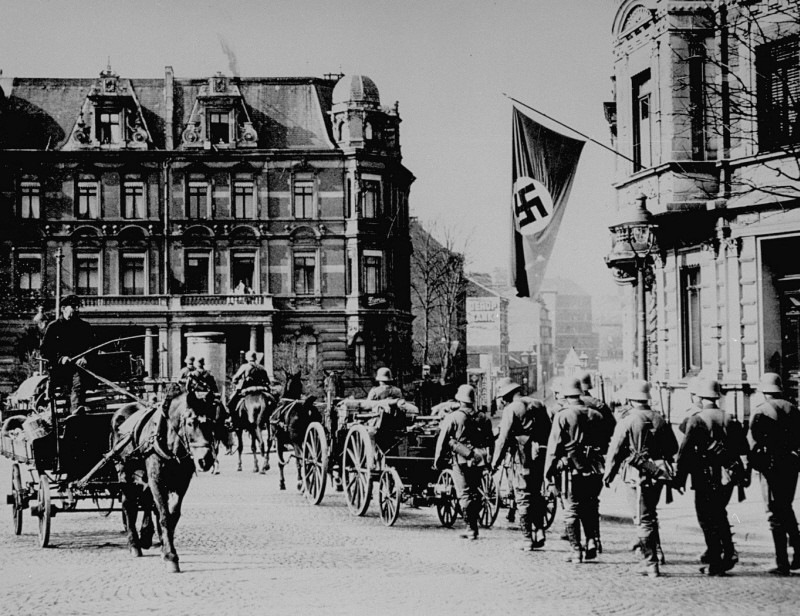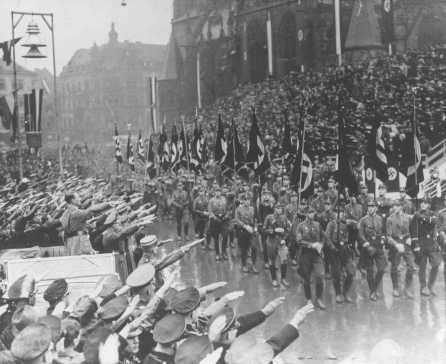

Adolf Hitler came to power with the goal of establishing a new racial order in Europe dominated by the German “master race.” This goal drove Nazi foreign policy, which aimed to: throw off the restrictions imposed by the Treaty of Versailles; incorporate territories with ethnic German populations into the Reich; acquire a vast new empire in Eastern Europe; form alliances; and, during the war, persuade other states to participate in the “final solution.”
This content is available in the following languages
Following the Nazi rise to power, Adolf Hitler's government immediately began preparing for the war he planned to wage to conquer Lebensraum in Poland and the Soviet Union. In Hitler’s vision, Germans would populate this area, the “inferior” Slavic population would be enslaved or driven out, and Jews would disappear entirely from all German-dominated territory.
The tasks of German foreign policy in preparing for the coming war were to: undo the military restrictions and reverse the territorial losses imposed by the Treaty of Versailles; take over neighboring lands with ethnic German populations; arrange pacts that would enable Germany to advance its war plans; and build alliances that would help Germany achieve its territorial goals. After the war began, German foreign policy aimed to strengthen existing alliances, build new ones, and obtain the cooperation of its allies and of the nations it conquered not only in Germany’s war effort but also in its racial policies, especially the annihilation of the Jews.

From 1933–1938, Konstantin von Neurath, a conservative career diplomat, served as German foreign minister. During his tenure, Germany followed a revisionist policy aimed at overcoming the restrictions imposed on Germany by the Treaty of Versailles and seizing the diplomatic initiative from Britain and France.
During Neurath’s term, Germany withdrew from the League of Nations; signed a nonaggression pact with Poland; reacquired the Saar territory through a plebiscite; reinstituted the draft and openly rearmed; signed a naval pact with Great Britain; remilitarized the Rhineland; militarily assisted the supporters of Francisco Franco in the Spanish Civil War; formed the “Rome-Berlin Axis” coalition with Italy and concluded the Anti-Comintern Pact with Japan.
In February 1938, Hitler replaced Neurath with Joachim von Ribbentrop, a Nazi Party member and former ambassador to Great Britain who advocated a more aggressive German foreign policy. Germany then moved to acquire new territories using the threat of war. In February, Hitler pressured Austrian chancellor Kurt Schuschnigg into signing the German-Austrian agreement ( Berchtesgaden Diktat ), which brought Nazis into the Austrian cabinet. In March 1938, Germany carried out the Anschluss , the annexation of Austria, after ensuring that Italy would not object.
German troops entered Austria on March 12, 1938. The annexation of Austria to Germany was proclaimed on March 13, 1938. In this German newsreel footage, Austrians express overwhelming enthusiasm for the Nazi takeover of their country.
Hitler then demanded that Czechoslovakia surrender the Sudetenland, a region bordering Germany with an ethnic German majority. On September 30, 1938, British Prime Minister Neville Chamberlain, French Premier Edouard Daladier, Italian fascist dictator Benito Mussolini, and Hitler signed the Munich agreement, which ceded the Sudetenland to Germany. In March 1939, Germany occupied and dismembered the rest of Czechoslovakia, establishing a German “protectorate” over the Czech lands and permitting the formation of Slovakia as a sovereign state with a pro-German regime.
Hitler then began planning to attack Poland, recognizing that this could lead to war with France and Great Britain. In May 1939, Hitler and Mussolini signed the “Pact of Steel,” a formal military alliance. Then on August 24, Ribbentrop and Soviet foreign minister Vyacheslav Molotov signed a non-aggression pact between Germany and the Soviet Union. In a secret protocol, the two states agreed to divide Poland between them.
This footage shows German forces entering the Sudetenland. Under the terms of the Munich Pact, Germany annexed this largely German-speaking region from Czechoslovakia. Germany, Italy, Britain, and France were party to the pact, which averted war. Czechoslovakia, however, was not permitted to attend the Munich conference. Hitler later violated the Munich Pact by destroying the Czech state in March 1939.
With no need to fear Soviet intervention, Germany attacked Poland on September 1, 1939. Britain and France, Poland's allies, declared war on Germany on September 3, 1939.
Germany’s defeat of Poland in 1939 and its conquest of Western European countries in spring 1940 enabled it to attract new allies with promises of territorial and economic gains. Italy entered the war on Germany’s side in June 1940, and in September Germany, Italy and Japan formed the Tripartite Pact. By the end of 1940, Hungary, Romania and Slovakia joined the Axis powers, followed by Bulgaria and Croatia in 1941.
The Nazi goal of obtaining Lebensraum in Eastern Europe led Germany to attack the Soviet Union in June 1941. Nazi leaders decided by the end of 1941 to carry out the “final solution” policy of systematically annihilating the Jews in Europe. The German Foreign Office played an important role in implementing this policy. German diplomats had the task of persuading Europe’s sovereign states to resolve their “Jewish question” themselves or by turning their Jewish population over to Germany. Slovakia and Croatia complied. Bulgaria, France, Hungary and Romania agreed to participate in measures against foreign Jews or Jews in newly acquired territories, but they balked at turning over their Jewish citizens. Denmark, Finland, and Italy refused. After Germany occupied the northern half of Italy in 1943 and Hungary in 1944, the governments there agreed to deport their Jewish populations. The German Foreign Office continued trying to persuade European governments to deport their Jewish population until Allied victories made such a step impossible.
After Germany’s defeat, both Neurath and Ribbentrop stood trial before the International Military Tribunal at Nuremberg. Neurath was sentenced to fifteen years’ imprisonment; Ribbentrop was sentenced to death and hanged.